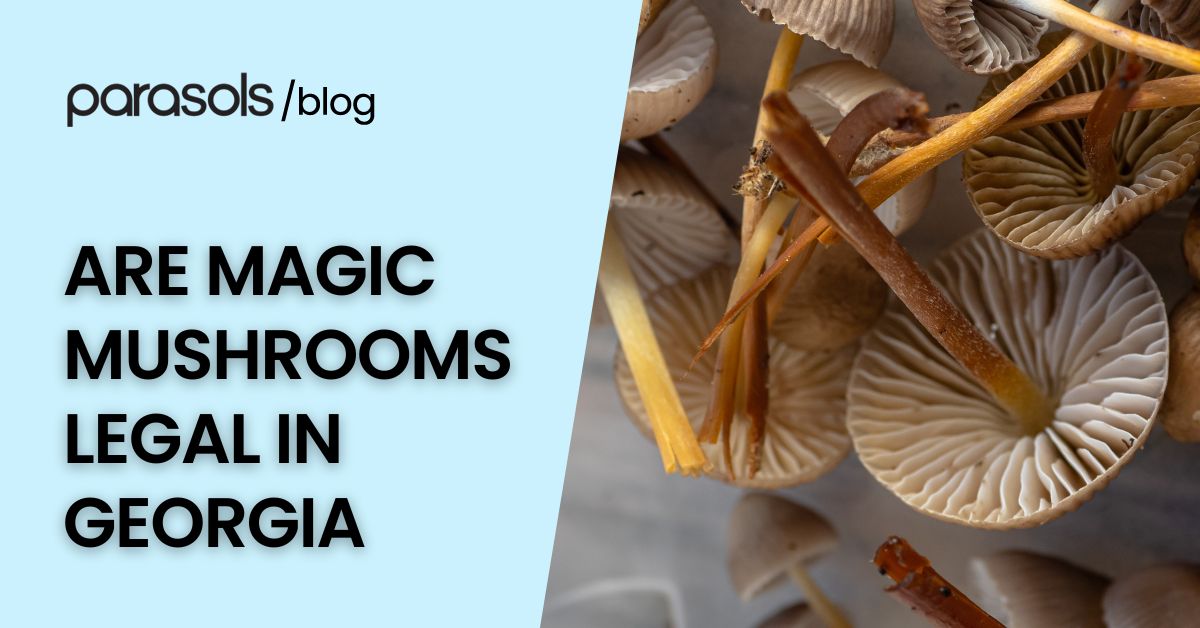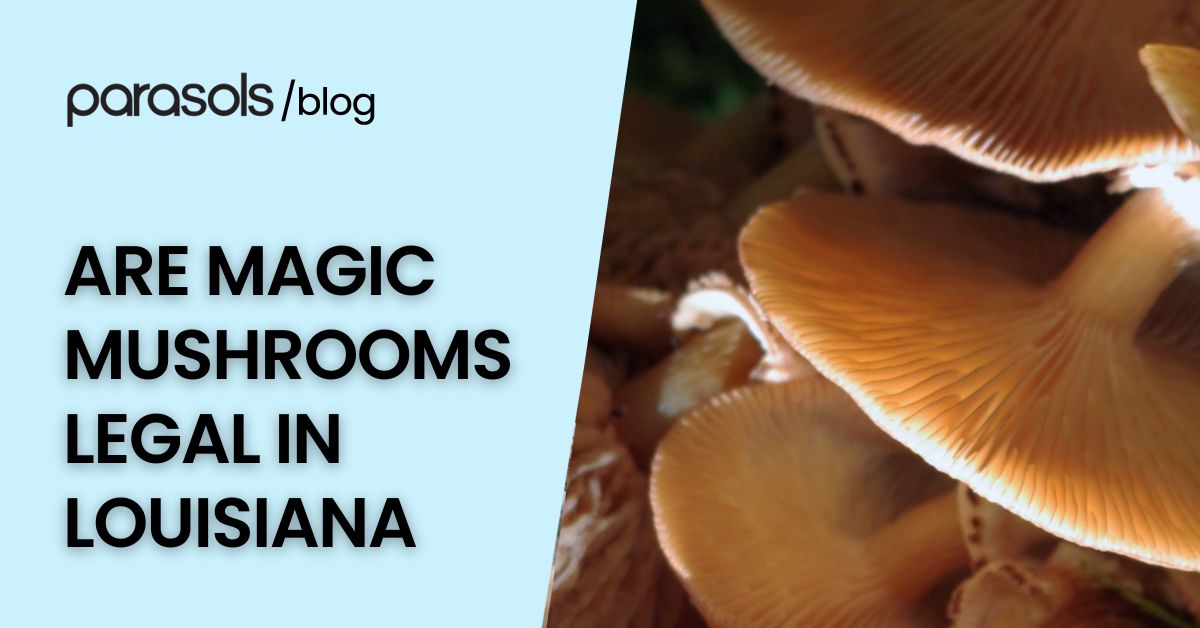Magic mushrooms — also called psilocybin mushrooms — are getting more attention these days, not just for their hallucinogenic effects but also for their potential therapeutic benefits in mental health treatment. But in Georgia, the legal status of these psychoactive fungi is far from friendly.
Key Takeaways
- Psilocybin mushrooms are illegal in Georgia under state and federal law.
- Possession, cultivation, or distribution is a felony with penalties up to 30 years.
- Psilocybin mushroom spores are also banned in the state.
- No legal pathway exists for medical or therapeutic psilocybin use.
- Legal alternatives include ketamine therapy, counseling, and low-THC cannabis oil.
Understanding Magic Mushrooms
Magic mushrooms are a type of psychoactive fungi that contain psilocybin, a natural compound famous for its hallucinogenic effects. People have been using these hallucinogenic mushrooms for centuries — often in spiritual rituals or for medicinal purposes — especially in indigenous cultures throughout South America.
These days, psilocybin mushrooms are getting attention for their potential therapeutic benefits, from helping with depression and anxiety to addressing substance use disorders. But in Georgia, psilocybin is classified as a Schedule I controlled substance under both Georgia law and the federal Controlled Substances Act.
That puts it in the same category as other illegal substances, meaning psilocybin use and even scientific research are tightly regulated and, in most jurisdictions, strictly illegal.
Are Magic Mushrooms Legal in Georgia?

No — magic mushrooms aren’t legal in Georgia. Psilocybin, the main psychoactive compound in these hallucinogenic mushrooms, is classified as a Schedule I controlled substance under both Georgia law and the federal Controlled Substances Act. In legal terms, that means the state sees it as having a high potential for abuse and no accepted medical use.
If you’re caught with psilocybin mushrooms in Georgia — whether it’s for personal use, sale, cultivation, or distribution — it’s considered a felony. Penalties can range from 1 to 30 years in prison, depending on the charge. Georgia even goes a step further by banning psilocybin mushroom spores, even though they don’t contain any of the psychoactive compound.
Right now, there’s no legal pathway for medicinal purposes or psilocybin-assisted therapy, and law enforcement agencies in Georgia keep a strict stance on these psychedelic substances. At the state level, there’s no active push to decriminalize possession or move toward psychedelic legalization, so the laws remain some of the toughest in the country.
Laws Surrounding Magic Mushrooms in GA
When it comes to magic mushrooms, Georgia doesn’t bend. While other states — and even certain cities — are starting to talk about psychedelic legalization or psilocybin therapy, Georgia law keeps things strict.
How Psilocybin Is Classified in Georgia
In Georgia, psilocybin — the compound in psilocybin mushrooms that causes hallucinogenic effects — is listed as a Schedule I controlled substance under the Georgia Controlled Substances Act. That puts it in the same category as other banned substances with no accepted medical use.
If you’re caught possessing, selling, growing, or distributing hallucinogenic mushrooms, it’s a felony, and the penalties can be steep — anywhere from 1 to 30 years in prison depending on the case.
No Medical or Therapeutic Loopholes
Right now, there’s no legal path for psilocybin-assisted therapy or medicinal purposes in Georgia. You won’t find approved clinical trials here either. The only somewhat similar, legal option is ketamine-assisted treatment, which can be used for conditions like treatment-resistant depression or PTSD.
Possible Legal Changes on the Horizon
In February 2025, lawmakers introduced House Bill 382, which would remove FDA-approved psilocybin products from Georgia’s Schedule I controlled substances list. If passed, it could open the door to medical use — but for now, it’s still just a proposal, and the current law hasn’t changed.
Enforcement Is Still Strict
Unlike some states that have made psilocybin a “lowest law enforcement priority” or tracked decriminalization efforts, Georgia hasn’t taken that route. Law enforcement agencies here still treat possession, cultivation, or distribution of psilocybin mushrooms as a criminal offense — even if it’s just for personal use.
Consequences for Possession and Use of Shrooms in GA
Georgia applies some of the strictest criminal statutes in the country for psilocybin mushrooms, with no medical exemptions or personal use defenses allowed.
- Felony charges for simple possession – In Georgia, even a small amount of psilocybin mushrooms counts as a felony. There’s no difference in how the law treats personal use versus larger amounts. A conviction can mean 1 to 10 years in prison.
- Harsher penalties for intent to distribute – If law enforcement agencies believe you planned to sell or share psilocybin mushrooms — based on quantity, packaging, or other evidence — penalties jump to mandatory minimums of 5 years and up to 30 years in prison, plus steep fines.
- Cultivation counts as manufacturing – Growing hallucinogenic mushrooms, even at home for personal use, is considered manufacturing a controlled substance. This is treated like producing other illegal substances, often leading to multiple felony counts and years behind bars.
- Spores are also illegal – Georgia law bans not only psilocybin mushrooms but also psilocybin mushroom spores. Even though spores don’t contain psilocybin, possession can still lead to criminal charges under the state’s strict interpretation of the law.
- Mandatory prison for repeat offenders – Prior drug convictions can trigger enhanced sentencing. Repeat offenses often come with mandatory prison time and limited chances for probation or parole.
- Permanent criminal record – A felony drug conviction stays on your record for life, making it harder to find work, get professional licenses, rent housing, receive student financial aid, or access public benefits.
- Loss of civil rights – Convictions can result in losing the right to vote, serve on a jury, or legally own firearms. In many cases, these rights aren’t automatically restored after serving your sentence.
- Rehabilitation or community service – Rare for felony psilocybin charges, but in some cases — often for first-time offenders if charges are reduced — courts may order drug education, probation, or hundreds of hours of community service.
Alternatives for Shrooms in GA
While psilocybin mushrooms are illegal in Georgia, a few legal alternatives exist for those seeking therapeutic or mood-enhancing options.
- Ketamine Therapy: Legally available for treatment-resistant depression and PTSD at licensed clinics.
- Talk Therapy: Traditional counseling and psychiatric care remain widely accessible and effective.
- Low-THC Cannabis Oil: Permitted for certain medical conditions with state registration.
- Mindfulness Practices: Meditation, breathwork, and guided visualization offer non-drug alternatives.
- Nootropics and Adaptogens: Legal supplements like lion’s mane and ashwagandha support cognitive and emotional health.
Final Thoughts

Georgia’s position on magic mushrooms is still clear-cut — psilocybin is banned, and penalties for possession, cultivation, or use can be severe. While research points to potential medical benefits, the state has yet to make any legal changes or open the door to psilocybin therapy.
If you’re looking for mental health support, legal options are available now that don’t carry the same risks. Learn more about safe, legal alternatives in Georgia and stay updated on any shifts in state or federal magic mushroom laws.
Frequently Asked Questions
Can you be arrested for having magic mushrooms in your system in Georgia?
Testing positive for psilocybin alone usually isn’t enough for an arrest, but possession of psilocybin mushrooms — or admitting to psilocybin use — can lead to criminal charges. Law enforcement agencies typically need physical evidence to move forward with a case.
Are there any religious or ceremonial exemptions for psilocybin use in Georgia?
No. Georgia law does not recognize religious or spiritual exemptions for using hallucinogenic mushrooms in ceremonies, rituals, or other practices.
Can tourists bring psilocybin mushrooms into Georgia from other states or countries?
No. Bringing psilocybin mushrooms into Georgia is illegal and treated as drug trafficking, even if the mushrooms were legal where they came from.
Are synthetic psilocybin products treated differently under Georgia law?
No. Synthetic psilocybin is also classified as a Schedule I controlled substance under Georgia law and carries the same legal penalties as natural psychedelic fungi.
Does Georgia have any pending ballot initiatives to legalize or decriminalize psilocybin?
Not at this time. There are no active ballot measures or statewide efforts to legalize psilocybin or decriminalize possession of psilocybin mushrooms in Georgia.
Is microdosing psilocybin legal in Georgia?
No. Microdosing still means possessing a Schedule I controlled substance. The amount doesn’t reduce the severity of the legal classification or penalties.
Can a psilocybin conviction be expunged from your record in Georgia?
Unlikely. Georgia’s expungement laws are limited, and felony drug convictions — including those involving psilocybin — generally can’t be removed from your criminal record under current statutes.



Leave a comment
This site is protected by hCaptcha and the hCaptcha Privacy Policy and Terms of Service apply.